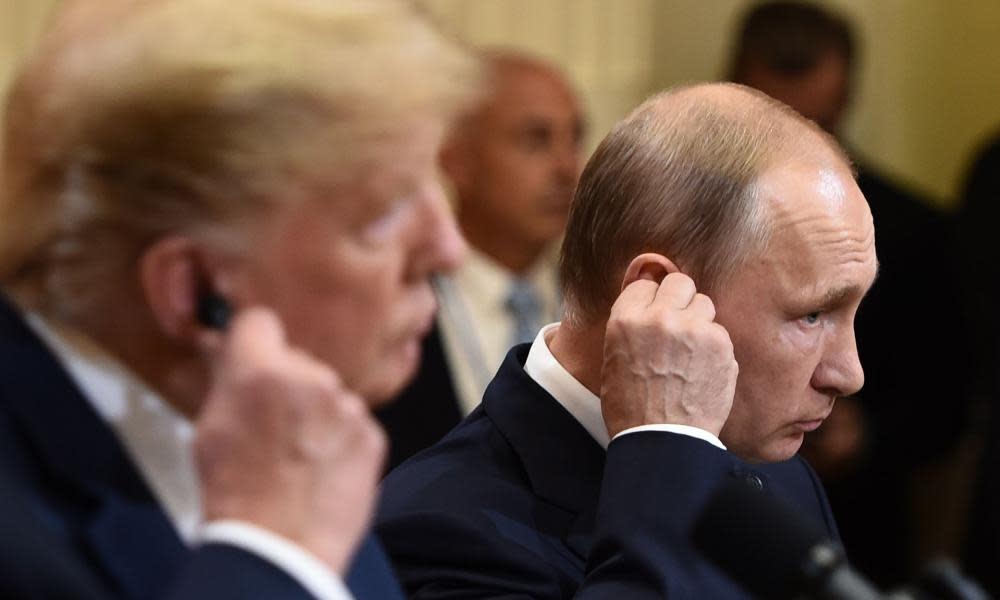Who's wooing who in the Trump-Putin relationship?

Donald Trump’s invitation to Vladimir Putin to visit Washington violates diplomatic norms in that the guest learned about the offer via Twitter, forcing him to calibrate in real diplomatic time how to respond.
At one level, a second encounter so soon after their first summit in Helsinki is the endorsement the Russian president craves – a symbolic end to the ostracism he has suffered since Russia’s ejection from the G8 in 2014. It would also go some way to normalising relations between the US and Russia, which Angela Merkel, the German chancellor, has welcomed.
For Putin’s domestic audience, it would be confirmation that the US president sees him if not as a partner, then at least a competitor that he can no longer ignore.
Russia would prefer the talks to be more formal than the exchanges in Helsinki, which would give Putin the chance to ensure that bureaucracies on both sides start to nail down some details.
Restarting nuclear disarmament, holding a referendum in Ukraine’s east Donbass region and protecting Israel’s interests at the close of the Syrian civil war would be huge Russian gains. It is not often, after all, that an American president says it is the US, and not Russia, that bears responsibility for the downturn in their relationship. So there is an incentive for Russia to seize this unprecedented opportunity.
But Russian officials, such as the ambassador to the US, Anatoly Antonov, appear genuinely taken aback by the negative reaction to the summit in the US. Putin himself has spoken of powerful forces seeking to undermine the summit.
The concern is not just the settled Democratic view that Putin views the president as an intelligence asset, but the hostility in principle towards better relations coming from senior Republicans.
A Reuters Ipsos Mori poll showed 56% of Americans think Putin did interfere on behalf of Trump in the 2016 elections, even if only 32% of Republicans think the same. But the Republican base is slowly eroding, and many are shifting uneasily at the sight of their president showing greater faith in Putin’s word than the analysis of the US intelligence services.
Looking at these polls, most Republican candidates for the mid-term elections in November would probably prefer not to have to defend the wisdom of Putin visiting the White House in the preceding weeks.
Putin may have covertly interfered in the 2016 elections to help Trump, but Moscow may calculate overt interference, through a highly charged visit in this autumn, is hardly likely to help Republican keep control of the Senate.
Trump, by doubling down on the Russian relationship, may have decided to risk defeat in November, but does Putin want to help him in this endeavour ?
Putin might propose a more modest alternative such as a meet up at the UN general assembly in New York in September or the G20 in Argentina in November, the kind of exchanges to which Barack Obama limited himself.
If Putin did take the risk and come to the US for a summit, it will not be his first visit since he has ruled Russia, something the White House was emphasising this week.
In November 2001, in the wake of the terrorist attack on New York World Trade Centre, George W Bush invited Putin to his ranch in Crawford, Texas for a two-day summit.
The two men failed to reach an agreement on a new missile treaty, even if their personal relations flourished. They answered questions at a school from students on women’s rights, the details of reducing their nuclear arsenals and their sudden race to put together a government in Afghanistan that represented a cross-section of the country’s fractious tribes, subjects that could easily come up again if Trump and Putin repeated the exercise. But Putin was an unknown quantity at the time, just over a year into power.
Bush and Putin met again in the US in 2007 at the Bush compound in Walker’s Point, Maine. They went fishing and discussed military defence systems in Poland and the Czech Republic. A year later, Putin invaded Georgia largely unconcerned by the American reaction.
The difficulty is that, after last week’s Helsinki summit, there are few signs, apart from the Trump-Putin personal relationship, to justify a new alliance. In the days since, Russian officials have spoken harshly about retaining east Ukraine, rejected a new body to investigate chemical weapons attacks and intensified the military campaign in Syria. In the US, hostility to Putin is mounting and it must be apparent to Moscow that Trump cannot yet carry US public opinion or his party with him.
With the Mueller investigation in the US and the UK investigation into Russian involvement in the poisoning of Sergei Skripal both yet to conclude, Moscow must recognise the chances of a new era in relations are built on fragile foundations.

 Yahoo News
Yahoo News 
